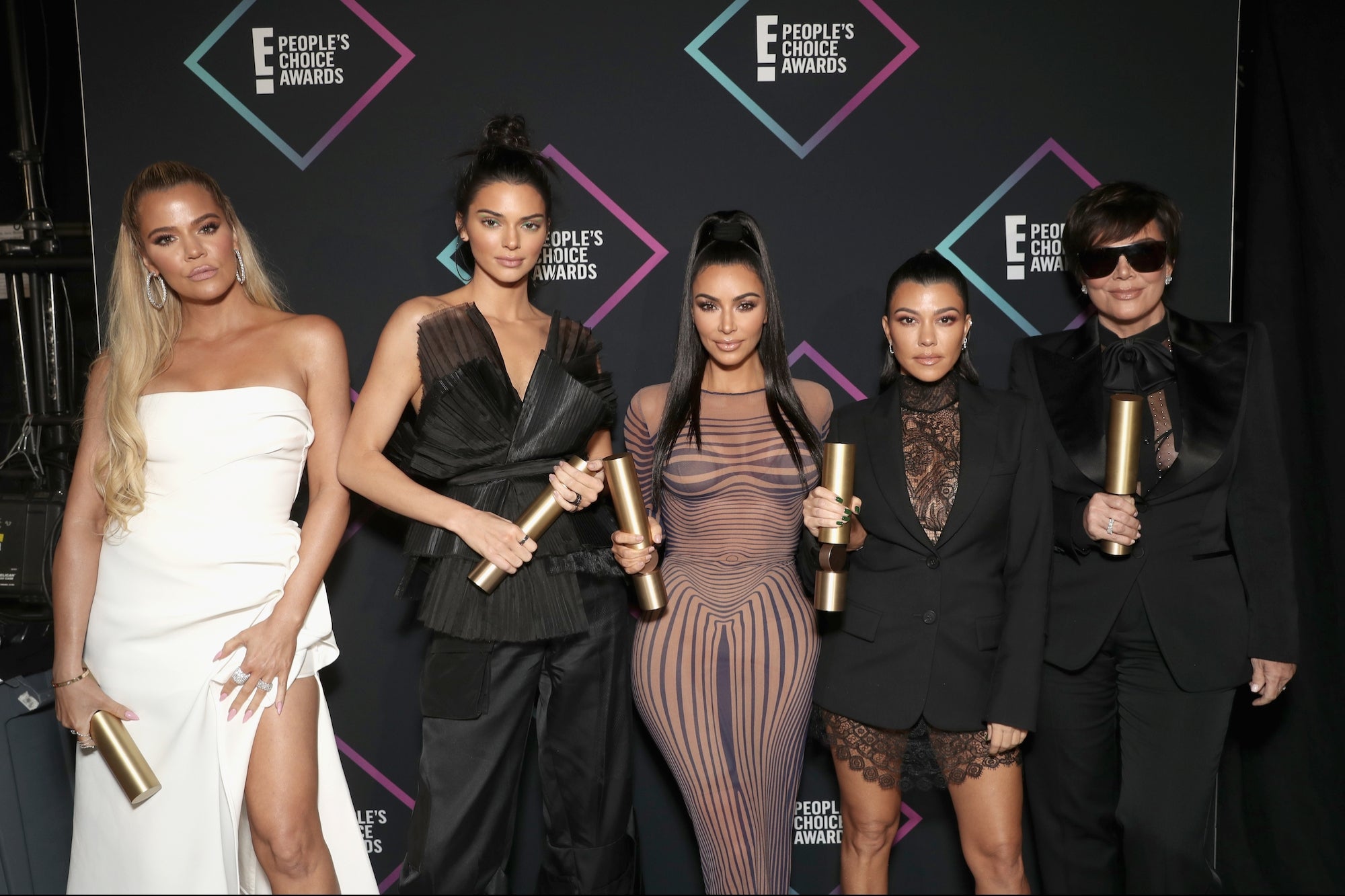Keeping Up With the Kardashian Businesses: See All of Their Entrepreneurial Efforts, From Skims to Kylie Cosmetics and Even Grandeza Hot Sauce The Kardashian-Jenners represent dozens of businesses worth millions.
Opinions expressed by Entrepreneur contributors are their own.

The Kardashians have turned their 15 minutes of fame into 15 years of making massive money. And with Season 3 of "The Kardashians" now underway on Hulu, they aren't stopping their entrepreneurial pursuits any time soon.
The family has been on television for decades, starting with their original show "Keeping Up With the Kardashians," which ran on E! for 20 seasons from 2007 to 2021, before jumping to Hulu and renaming the show, "The Kardashians" in 2022 — in a deal worth just under $100 million, per Time. There were also a few spinoffs, such as 2009's "Kourtney and Khloe Take Miami." The duo also "took" New York in 2011.
What people thought would be a blip in reality TV history — a quirky show about a privileged family enthralled into the spotlight after a scandal — has transformed into a lucrative enterprise of businesses for the entire family, proving to the public that they are more than TV personalities.
Where Did the Kardashian Business Ventures Begin?
The Kardashians began with retail stores Smooch, a kids' clothing store that closed in 2009 after six years in business, and Dash, a women's clothing store in California that opened in 2006, per E! News.
Despite creating now lucrative companies like Skims, worth $3.2 billion, and Good American, which boasts $200 million in sales, there have also been some bigtime flops, such as the PerfectSkin skincare line and the Kardashian Kard prepaid debit card, both of which only lasted one year in 2010. The family also had joint business ventures, such as the Kardashian Kollection at Sears (2011 - 2015) and Kardashian Beauty (2012 - 2016).
Having a hard time keeping up with all of the Kardashian businesses? Keep scrolling for everything to know.
Kim Kardashian
With a net worth of over $1 billion, Kim has dabbled in multiple businesses over the last two decades including the "Kim Kardashian: Hollywood" video game (2014 - present), which was acquired by Glu Mobile in a $2.4 billion deal in 2021, and her emojis or "Kimojis" (2015 – 2018), which reportedly made $1 million per minute in its heyday.
In 2009, she launched the shoe subscription service ShoeDazzle with Brian Lee and Robert Shapiro, which was later bought by JustFab in 2013 with an estimated value of $30 million at the time, per Business Insider.
Kim launched KKW Beauty, known for its signature contour sticks, in 2017 and KKW Fragrance that same year. Although KKW Beauty once had a $1 billion valuation, she closed both companies in 2021 to develop a "completely new brand" that would be one-stop shopping for her loyal customers, per People.
Kim launched Skims, a solution-based shapewear brand, in 2019, and the company sold $2 million worth of products just minutes after it debuted. Today, Skims is valued at $3.2 billion.
Kim's SKKN by Kim skincare brand launched in 2022 and features an array of products, including face cream, eye cream, and a cleanser that, when purchased as a bundle, costs up to $630.
Now, Kim is pivoting into venture capital with her latest project, private equity firm SKKY Partners, which launched in September 2022 to invest and build in hospitality, media, and luxury businesses.
Kim is also studying to be a lawyer. After passing the baby bar in 2021, she's awaiting the next exam, as she showed fans on Instagram in February.
In October 2022, Kim told Entrepreneur she tries to stay calm while managing it all.
"I stay really calm, and that is what gets me through so many situations," she said in Entrepreneur's 100 Women of Influence issue. "Especially in work emergencies. They come up, and you've got to deal. Whether it's supply chain or the cost of goods going up, things will always happen. You have to be prepared and move with the times."
Kourtney Kardashian
Fans of "The Kardashians" know oldest sister Kourtney's focus is on her family, but in recent years, she launched several new brands, including the wellness and lifestyle website Poosh in 2019. The company currently boasts 4.8 million followers on Instagram.Kourtney's latest brainchild is Lemme, a line of gluten-free, vegan, non-GMO gummy vitamins and supplements. After introducing the brand in September, the product has sold out numerous times. The gummies are now carried on Amazon.
Kourtney has also been involved in several collaborations, including her Boohoo x Kourtney Kardashian Barker clothing line collab and her partnership with her husband Travis Barker's wellness brand, Barker Wellness.
Khloe Kardashian
Unlike her famous siblings, Khloe Kardashian keeps her energy focused on one business: Good American. In 2016, she launched the inclusive denim brand with entrepreneur Emma Grede. The brand has since expanded to swimwear and womenswear, focusing on size inclusivity and offering a range from 00 to size 24.
By implementing stretchy fabrics that mold and fluctuate with a woman's body, the brand brought in more than $200 million in sales last year and employs over 100 people.
Kardashian and Grede graced Entrepreneur's cover in May 2023.
Today, Good American is sold at major retailers, including Nordstrom.
"Good American isn't doing this just because we wanted to have a buzz-worthy moment. This is something that we genuinely believe in," Kardashian told Entrepreneur about creating the size-inclusive brand after struggling to find clothes herself. "I never want my daughter — or anybody — to go through that experience that I went through. I want them to feel seen and represented."
Kylie Jenner
When she was 18, Kylie Jenner was the first member of the Kardashian-Jenner clan to launch her makeup brand. After making headlines for using lip filler, she doubled down on the media gossip and launched Kylie Cosmetics with three "lip kits" — composed of a liquid lipstick and a lip liner. The products sold out immediately.
The brand expanded into other makeup products, such as eyeshadow palettes, and into the skincare and baby markets with Kylie Skin and Kylie Baby. Kylie Cosmetics generated $420 million in its first 18 months in business, according to Women's Wear Daily, and hit the $1 billion milestone in 2019, three years before previously estimated.
That same year, the brand was valued at $1.2 billion after Kylie sold 51 percent of her business to Coty Inc. in a $600 million deal.
Kendall Jenner
While her siblings have the beauty and fashion retail markets locked down, Kendall Jenner took a different route to entrepreneurship. Kendall started as a model in 2011 and graced magazine covers and runways until she earned the title of "world's highest-paid supermodel" in 2018, with $22.5 million in earnings that year.
In 2021, Kendall launched 818 Tequila, a hand-crafted tequila brand produced at a family-owned-and-operated distillery in Jalisco, Mexico.
In its first year, 818 became the best-selling new spirit brand of 2021 in the United States and has continued to expand its product line since, per PR Newswire. After only seven months in business, the brand shipped 136,000 cases, or 1.5 million bottles.
Before founding 818, she also created the Kendall Jenner Teeth Whitening Pen with the oral hygiene brand Moon in 2019.
Rob Kardashian
Rob Kardashian may stay out of the limelight today, but that hasn't stopped him from pursuing entrepreneurship.
He launched his sock line, Arthur George, in 2012, and the brand is still active today with 376K Instagram followers. However, he reportedly sold 50 percent of the business to his mom Kris Jenner in 2018 to keep afloat after allegedly falling into $300,000 worth of debt. Despite the setback, the socks are still available on its website.
In addition to Arthur George, Kris revealed on "The Kardashians" that she and Rob are working together to create their own natural, vegan-friendly hot sauce called Grandeza Hot Sauce.
Kris Jenner
Besides supporting her kids in their business endeavors, Kris Jenner has made some business deals of her own. The momager gets a 10 percent cut of every dollar her kids bring, and she is the CEO of Jenner Communications production company. She also has started her brand of non-toxic cleaning products, Safely, which is set to be released in 6,000 stores across the U.S. throughout 2023.










